英语语法大攻克--中考一般将来时
英语语法大攻克--中考复习时态(一般将来时)
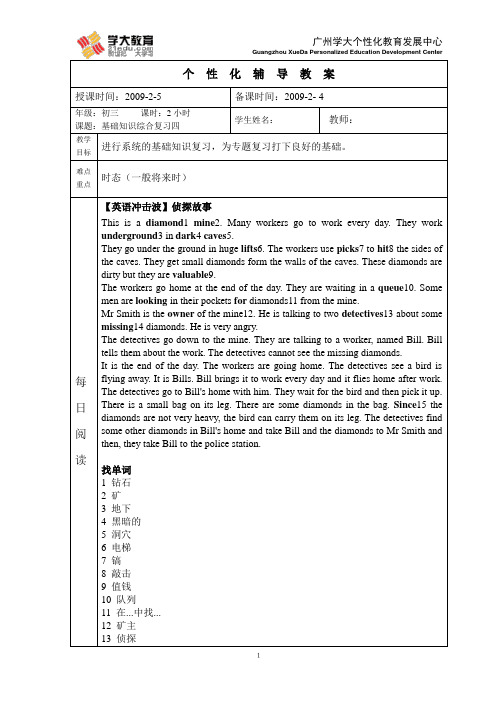
个性化辅导教案授课时间:2009-2-5 备课时间:2009-2- 4年级:初三课时:2小时课题:基础知识综合复习四学生姓名:教师:教学目标进行系统的基础知识复习,为专题复习打下良好的基础。
难点重点时态(一般将来时)每日阅读【英语冲击波】侦探故事This is a diamond1 mine2. Many workers go to work every day. They work underground3 in dark4 caves5.They go under the ground in huge lifts6. The workers use picks7 to hit8 the sides of the caves. They get small diamonds form the walls of the caves. These diamonds are dirty but they are valuable9.The workers go home at the end of the day. They are waiting in a queue10. Some men are looking in their pockets for diamonds11 from the mine.Mr Smith is the owner of the mine12. He is talking to two detectives13 about some missing14 diamonds. He is very angry.The detectives go down to the mine. They are talking to a worker, named Bill. Bill tells them about the work. The detectives cannot see the missing diamonds.It is the end of the day. The workers are going home. The detectives see a bird is flying away. It is Bills. Bill brings it to work every day and it flies home after work. The detectives go to Bill's home with him. They wait for the bird and then pick it up. There is a small bag on its leg. There are some diamonds in the bag. Since15 the diamonds are not very heavy, the bird can carry them on its leg. The detectives find some other diamonds in Bill's home and take Bill and the diamonds to Mr Smith and then, they take Bill to the police station.找单词1 钻石2 矿3 地下4 黑暗的5 洞穴6 电梯7 镐8 敲击9 值钱10 队列11 在...中找...12 矿主13 侦探14 丢失的15 由于句子必备A friend in need is a friend indeed.患难见真情。
初中英语中考语法复习重难点微专题(13)一般将来时四种语法形式全面解析
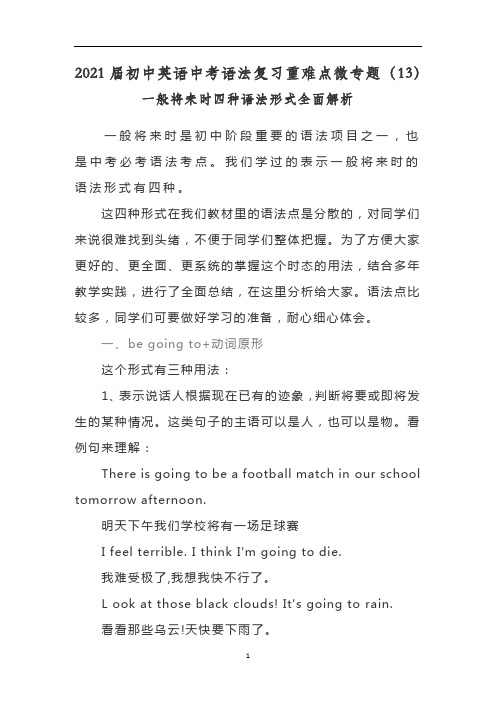
2021届初中英语中考语法复习重难点微专题(13)一般将来时四种语法形式全面解析一般将来时是初中阶段重要的语法项目之一,也是中考必考语法考点。
我们学过的表示一般将来时的语法形式有四种。
这四种形式在我们教材里的语法点是分散的,对同学们来说很难找到头绪,不便于同学们整体把握。
为了方便大家更好的、更全面、更系统的掌握这个时态的用法,结合多年教学实践,进行了全面总结,在这里分析给大家。
语法点比较多,同学们可要做好学习的准备,耐心细心体会。
一、be going to+动词原形这个形式有三种用法:1、表示说话人根据现在已有的迹象,判断将要或即将发生的某种情况。
这类句子的主语可以是人,也可以是物。
看例句来理解:There is going to be a football match in our school tomorrow afternoon.明天下午我们学校将有一场足球赛I feel terrible. I think I'm going to die.我难受极了,我想我快不行了。
L ook at those black clouds! It's going to rain.看看那些乌云!天快要下雨了。
2、表示主观现在的意图或现在已作出的决定,打算在最近或将来要做某。
这种意图或决定,往往都是事先经过考虑的。
看例子来体会:He isn't going to see his elder brother tomorrow. 他明天不准备去看他的哥哥。
Mary is going to be a teacher when she grows up. 玛丽决定长大了当一名教师。
3、只是单纯的预测未来的事,这个时候可以和will互换。
这一点对同学们来说是比较容易理解的,我们举一个简单的例子:I think it is going to/will rain this evening。
我认为今晚要下雨。
初中英语2024届中考语法复习一般现在时和一般将来时知识讲解
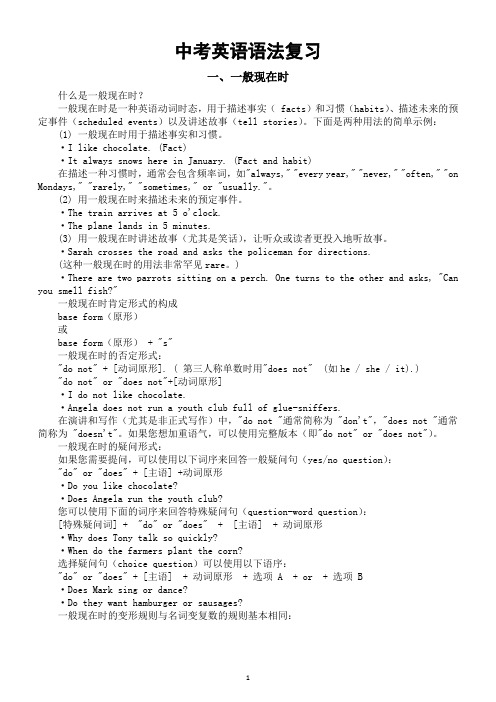
中考英语语法复习一、一般现在时什么是一般现在时?一般现在时是一种英语动词时态,用于描述事实( facts)和习惯(habits)、描述未来的预定事件(scheduled events)以及讲述故事(tell stories)。
下面是两种用法的简单示例:(1) 一般现在时用于描述事实和习惯。
·I like chocolate. (Fact)·It always snows here in January. (Fact and habit)在描述一种习惯时,通常会包含频率词,如"always," "every year," "never," "often," "on Mondays," "rarely," "sometimes," or "usually."。
(2) 用一般现在时来描述未来的预定事件。
·The train arrives at 5 o'clock.·The plane lands in 5 minutes.(3) 用一般现在时讲述故事(尤其是笑话),让听众或读者更投入地听故事。
·Sarah crosses the road and asks the policeman for directions.(这种一般现在时的用法非常罕见rare。
)·There are two parrots sitting on a perch. One turns to the other and asks, "Can you smell fish?"一般现在时肯定形式的构成base form(原形)或base form(原形) + "s"一般现在时的否定形式:"do not" + [动词原形]. ( 第三人称单数时用"does not" (如he / she / it).)"do not" or "does not"+[动词原形]·I do not like chocolate.·Angela does not run a youth club full of glue-sniffers.在演讲和写作(尤其是非正式写作)中,"do not "通常简称为 "don't","does not "通常简称为 "doesn't"。
【初中英语】初中英语语法大全之一般将来时
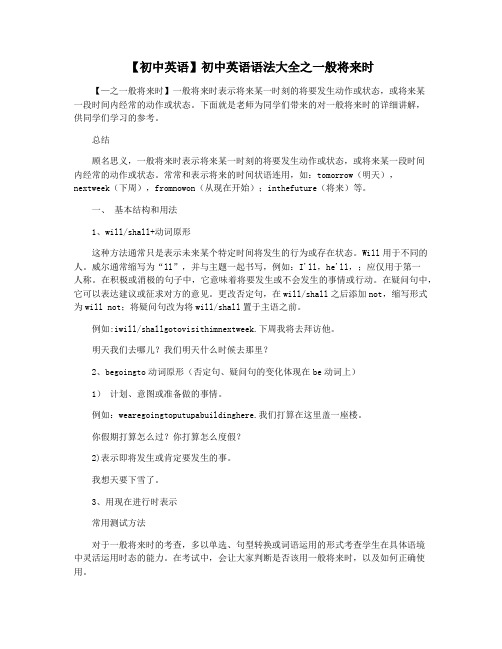
【初中英语】初中英语语法大全之一般将来时【—之一般将来时】一般将来时表示将来某一时刻的将要发生动作或状态,或将来某一段时间内经常的动作或状态。
下面就是老师为同学们带来的对一般将来时的详细讲解,供同学们学习的参考。
总结顾名思义,一般将来时表示将来某一时刻的将要发生动作或状态,或将来某一段时间内经常的动作或状态。
常常和表示将来的时间状语连用,如:tomorrow(明天),nextweek(下周),fromnowon(从现在开始);inthefuture(将来)等。
一、基本结构和用法1、will/shall+动词原形这种方法通常只是表示未来某个特定时间将发生的行为或存在状态。
Will用于不同的人。
威尔通常缩写为“ll”,并与主题一起书写,例如:I'll,he'll,;应仅用于第一人称。
在积极或消极的句子中,它意味着将要发生或不会发生的事情或行动。
在疑问句中,它可以表达建议或征求对方的意见。
更改否定句,在will/shall之后添加not,缩写形式为will not;将疑问句改为将will/shall置于主语之前。
例如:iwill/shallgotovisithimnextweek.下周我将去拜访他。
明天我们去哪儿?我们明天什么时候去那里?2、begoingto动词原形(否定句、疑问句的变化体现在be动词上)1)计划、意图或准备做的事情。
例如:wearegoingtoputupabuildinghere.我们打算在这里盖一座楼。
你假期打算怎么过?你打算怎么度假?2)表示即将发生或肯定要发生的事。
我想天要下雪了。
3、用现在进行时表示常用测试方法对于一般将来时的考查,多以单选、句型转换或词语运用的形式考查学生在具体语境中灵活运用时态的能力。
在考试中,会让大家判断是否该用一般将来时,以及如何正确使用。
典型的例子1:他在下一个星期的时候很漂亮。
a.givesb.gavec.willgivingd.isgoingtogive在她的下一个生日,我们可以看到这句话是关于未来的;动词的原形应该加在will 之后,所以C不包括在内;是一般将来时态的正确用法。
初中英语语法一般将来时

初中英语语法一般将来时一是表示将来的决定、承诺、意愿或预测;二是表示将来的惯或经常性动作;三是表示将来的突发事件。
going to则强调现在已经有了计划、安排或打算,即已经准备好要做某事了。
例如:I will call you later.(我会给你打电话。
)表示决定或承诺。
He will be a great doctor one day.(他将来会成为一名伟大的医生。
)表示预测。
I will always love you.(我将永远爱你。
)表示意愿。
We will have a meeting every Monday.(我们每周一都会开会。
)表示惯或经常性动作。
I will help you if you need it.(如果你需要,我会帮助你。
)表示突发事件。
She is going to study abroad next year.(她明年要出国留学。
)表示已经有了计划或打算。
一般现在时表示将来通常用于表示时间表或日程安排。
The train leaves at 8 am tomorrow.明天早上8点火车离开。
The conference starts on Monday.会议从星期一开始。
I have a dentist appointment next week.我下周有牙医约会。
1.The train will leave at six tomorrow morning。
indicating a future event that has already been led.2.The use of the future tense can also be seen in time or nal clauses。
as in "I'll write to you as soon as I arrive there" and "If it doesn't rain tomorrow。
初中英语语法一般将来时

一般将来时一.一般将来时的定义:表示将来某一个时间将要发生的动作或存在的状态,表示将来经常或重复发生的动作。
二.一般将来时的标志:tomorrow(明天),the day after tomorrow(后天)next year(明年)next month(T—个月)next week(下一个星期)3.一般将来时的构成:1.主语^be(am,is,are)going to+动词原形+..例如:(1).I am going to play football tomorrow.明天我将要踢足球.(2).She is going to watch a movie the day after tomorrow.后天她要看一场电影.2.主语+will/shall+动词原形+.....说明:(l).will/shall有时可以和be going to互换;(2) .will是万能的,shall只能用在第一人称,主语是I,we.(3) .will和shall的后而接动词原形)例如shall/will go to Beijing next month.。
will=I11)下个月我将要去北京.(2) .You will come to see me tomorrow.(you will=you'll)明天你将要来看我.(3) .She will read English tomorrow moming.(She will=She'll)明天早上她将要读英语.四.句一般将来时的式:1.肯定句:(1) ..主语+be(am,is,are)going to+动词原形+......(2) ..主语+will/shall+动词原形+.....例句和上面一样,就不举了.2.否定句:(1)..主语+be(am,is,are)not going to+动词原形+......例如:(A):I am not going to play basketball tomorrow.明天我不将踢足球.(B).She is not/isn't going to visit Shanghai next year.明年她不将参观上海.(2)..主语+will/shall not+动词原形+.....(A).I shall not go to school the day after tomorrow o后天我不将上学了(B).I will not write my homework this evening.(will notl=I won't)今晚我不将写作业(C).She will not see a movie next week.(will not=won't)下个星期她将不看一场电影.3.一般疑问句:(A).Am/Is,Are+主语+going to+动词原形+....例如(A).—Am I going to see my grandfather tomorrow?明天我将去看我的爷爷吗?—Yes,you are.是的,你将去.(B).— Are you going to listening to the tape tomorrow?明天你将听录音带吗?—No,I am not.不,我不将.(C). —Is she going to Beijing next year? 明年我将去北京吗?-Yes,she is.是的,她将.(2).Will//shall+主语+动词原形+…例如(A). —Shall we play volleyball next class?下一节课我们将打排球吗?-Yes,you will,是的,你们将.(B). —Will you come here next week?下个星期你将来这儿吗?-Yes,I will.是的,我将.(C).--Will she teach us this term?这学期,她将教我们吗?—Yes,she will.是的,她将.4.特殊疑问句:(1).What(Where,How...)+be(am,is,are)+主语+going to+动词原形+...?例如:(A).—What are you going to do tomorrow? 明天你将要做什么?—rm going to the park? 我将要去动物园.(B).--Where are you going to swim? 你将要去哪儿游泳?—I'm going to swim in the river.(2). What(When,Where,How...)+主语+动词原形+...?例如:(A).---What will you do next week?下个星期你将要做什么?--1 will do my homeworko 我将要做作业.(B).—How will she come here tomorrow?明天她将要怎么来这儿?—She will come here by bus 。
中考英语动词时态精练解析版--一般将来时
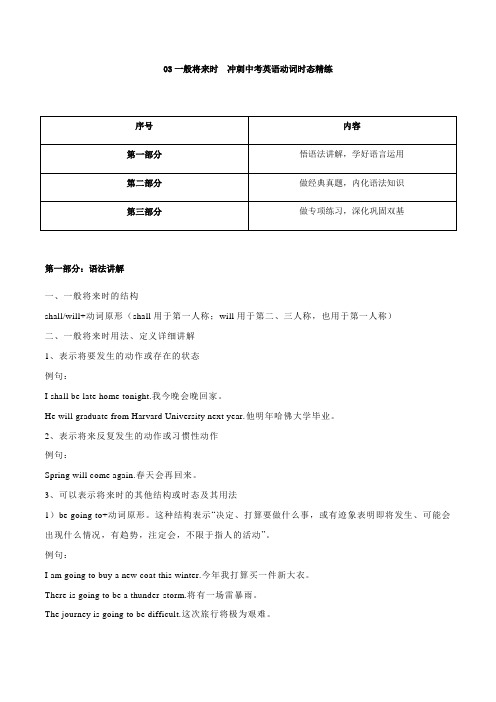
03一般将来时冲刺中考英语动词时态精练第一部分:语法讲解一、一般将来时的结构shall/will+动词原形(shall用于第一人称;will用于第二、三人称,也用于第一人称)二、一般将来时用法、定义详细讲解1、表示将要发生的动作或存在的状态例句:I shall be late home tonight.我今晚会晚回家。
He will graduate from Harvard University next year.他明年哈佛大学毕业。
2、表示将来反复发生的动作或习惯性动作例句:Spring will come again.春天会再回来。
3、可以表示将来时的其他结构或时态及其用法1)be going to+动词原形。
这种结构表示“决定、打算要做什么事,或有迹象表明即将发生、可能会出现什么情况,有趋势,注定会,不限于指人的活动”。
例句:I am going to buy a new coat this winter.今年我打算买一件新大衣。
There is going to be a thunder-storm.将有一场雷暴雨。
The journey is going to be difficult.这次旅行将极为艰难。
2)be going to和will等的比较。
①will表示说话人认为、相信、希望或假定要发生的事,不含任何具体时间,可以指遥远的将来。
而be going to指有迹象表明某事即将发生或肯定会发生,通常表示很快就要发生的事情。
例句:There is going to be a quarrel between them, I think.看来两人要发生争吵了。
He is going to get better.他的病就要好了。
②be going to和will均可表示“意图”;但事先考虑过的意图用be going to,而不是事先考虑的意图用will。
例句:A: Why have you torn the paper into pieces?B: I am going to rewrite it. (事先考虑的)A: It is a really big stone.B: I will help you to move it. (未经考虑的)3)现在进行时。
初中英语一般将来时语法精讲

初中英语一般将来时语法精讲初中英语一般将来时语法精讲初中英语一般将来时语法大全精讲【—一般将来时精讲】对于英语一般将来时语法知识的讲解内容,希望同学们能很好的掌握。
一般将来时表示将来某一时刻或经常发生的动作或状态。
①一般将来时的时间状语有:tomorrow,this (afternoon),next (year),one day,now,soon,someday,sometime, in the future, when引导的从句等。
② 用will构成的将来时,表示动作与人的主观愿望无关。
“shall”用于第一人称,“will”用于所有人称。
如:I will graduate from this school soon.(我很快就要从这所中学毕业了)/ You will stay alone after I leave.(我走了之后你就要一个人过了)③ “am/is/are going to+动词原形”表示打算或准备要做的事情,或者主观判断即将要发生的事情,而“am/is/are to +动词原形”表示安排或计划中的动作。
如:A man told them that the woman was to give birth to the special baby.(有一个人告诉他们那个妇女就会生下那个特别的男孩)/ It’s going to rain soon.(天快要下雨了)④ 表示一个人临时决定要做某事,可以用will表达。
如:I will go to the lab to get somechemicals(化学药剂). So please wait until I return.(我要到室去取些药品,请等我回头)⑤ 现在进行时、一般现在时也可以表示将来。
(见相应时态)⑥ shall和will 在口语的一些疑问句中相当于情态动词。
Shall一般与第一人称连用,will与第二人称连用。
如:Shall we go to the zoo next Saturday?(我们下周六去动物园好吗?)/ Will you please open the door for me?(替我把门打开好吗?)⑦ “be to +动词原形”表示按照计划将要发生的事情。
- 1、下载文档前请自行甄别文档内容的完整性,平台不提供额外的编辑、内容补充、找答案等附加服务。
- 2、"仅部分预览"的文档,不可在线预览部分如存在完整性等问题,可反馈申请退款(可完整预览的文档不适用该条件!)。
- 3、如文档侵犯您的权益,请联系客服反馈,我们会尽快为您处理(人工客服工作时间:9:00-18:30)。
英语中考复习时态系列之(五)一般将来时
一般将来时表示将要发生的动作或存在的状态以及计划、打算做某事。
E.g. They will have a football match tomorrow. He will be thirty next week. She is going to buy a coat this afternoon.
其结构有如下几种: 1)will + 动词原形(will可以用于任何人称) 需要注意的是当主语是第一人称时will可以换成shall,特别是在以I或we作主语的问句中,一般用shall. e.g. Shall we go to the zoo? 2)be going to +动词原形3)现在进行时也可表示将来,前边已经讲过,这里不在重复.
第一种结构的句式变化是: 变否定句在will后边加not. 变一般疑问句把will提前. e.g. She will be back in three days. She will not be back in three days. Will She be back in three days? 第二种结构的句式变化要在be上做文章. E.g. They are going to clean their classroom. They are not going to clean their classroom. Are they going to clean their classroom?
其时间状语有如下几种1)this引导的短语如this year 2)tomorrow及其相关短语如tomorrow morning 3)next引导的短语如next month 4) from now on ; in the future ; in an hour 等。
做题时常见错误如下:
一、易忽视动词用原形形式
例:1 He will is (be) at school next Monday.
2 He is going to does (do) his homework after school.
答案:1 be 2 do
解析:第一题有的同学一看he做主语就用了is,忽视了will后应加动词原形。
我们在写句子时,很容易把动词丢掉,“英语句子里,动词不能少”的规律必须要牢记。
第二题中to后加动词原形,而不是用单三人称.
二、be going to +动词原形与will+动词原形用法不清楚
例:我正努力学习,准备参加英语考试。
I am studying hard and I will try for my English exams.
答案:I am studying hard and I am going to try for my English exams.
解析:“be going to”表示计划、打算要做某事。
E.g. He is going to visit his friends. 还表示某种迹象表明会发生某事.e.g. Look at the clouds. It’s going to rain. 而“Will+动词原形”指对将来事物的预见、表示意愿、决心。
E.g. I will wait for you until you come. 在单纯预测未来时,二者可以互换,但在此题中只能用be going to,而不能用will
三、There be结构的一般将来时易出错
例:There_________ a basketball match this afternoon. (B)
A is going to be
B is going to have
C are going to be
D are going to have
答案:A
解析:There be结构的一般将来时既要符合There be结构,又要符合一般将来时。
有的同学认为have当“有”讲,所以选了B,但There be结构就不成立了,此句中is是be going to 中的,是由后边的单数名词决定的.
四、be going to结构中易丢掉to
例:I’m going _______(go) school by bike tomorrow. (C)
A to will go
B to go to
C go to
D to go
答案:B
解析:由tomorrow可知是一般将来时,be going to +动词原形,所以先确定用to go , 在B、D当中选,而go to school 是固定词组,不能因为前边有一个to而省略,这是一个易错点,需要注意。
另外,在时间状语或条件状语从句中,若主句用了将来时,从句则用一般现在时,前边已经讲过,这里不在重复.
专项练习:
一、单选
1 _____you ____a doctor when you grow up?
A Will; going to be
B Are; going to be
C Are; /
D Will; be
2 I don’t know if his uncle _____. I think he _____ if it doesn’t rain.
A will come; comes
B will come; will come
C comes; comes
D comes; will come
3 He will be back _____a few minutes.
A with
B for
C on
D in
4 What time _____we meet at the gate tomorrow?
A will
B shall
C do
D are
5 He will have a holiday as soon as he _____the work next week.
A finishes
B doesn’t finish
C will finish
D won’t finish
6 There _____some showers this afternoon.
A will be
B will have
C is going to be
D are going to have
7 It ____my brother’s birthday tomorrow. She _____a party.
A is going to be; will have
B will be; is having
C will be; is going to have
D will have; is going to be
8 Li Ming is 10 years old now, next year he _____11.
A is
B is going to be
C will be
D will to be
答案:1 B 2B 3 D 4 B 5A 6A 7 C 8 C
二、填空
1 -“I need some paper.”
- “I ____(bring)some for you.”
2____(be)you free tomorrow?
3 They _________(not leave) until you come back.
4 _____we_____(go) to the party together this afternoon?
5 They want to know when the meeting _____start.
6 I _____(go) with you if I have time.
7 Hurry up! Or we ______(be) late.
8What ____you _______(do) tomorrow afternoon?
9 Jenny ____ _____ (do) an experiment the day after tomorrow.
10 If she isn’t free tomorrow, she _______(not take) part in the party.
答案: 1 will bring 2 Are 3 won’t leave 4Shall go 5 will 6 will go
7 will be 8 are going to do 9 will do 10 won’t take。
